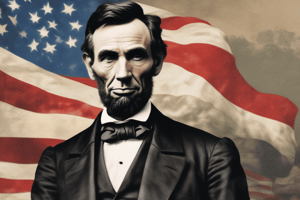Podcast
Questions and Answers
What was one of the primary purposes of establishing Grant's 5 military districts?
What was one of the primary purposes of establishing Grant's 5 military districts?
What significant agreement was made in the Compromise of 1877?
What significant agreement was made in the Compromise of 1877?
What consequence followed the end of the military districts according to the information provided?
What consequence followed the end of the military districts according to the information provided?
According to historians, how is the legacy of Reconstruction characterized?
According to historians, how is the legacy of Reconstruction characterized?
Signup and view all the answers
What major civil rights legislation did not occur until 1965, highlighting the issues that arose during Reconstruction?
What major civil rights legislation did not occur until 1965, highlighting the issues that arose during Reconstruction?
Signup and view all the answers
What was John Wilkes Booth's primary motivation for assassinating Abraham Lincoln?
What was John Wilkes Booth's primary motivation for assassinating Abraham Lincoln?
Signup and view all the answers
What event marked the day Lincoln was assassinated?
What event marked the day Lincoln was assassinated?
Signup and view all the answers
After his assassination, how did Lincoln's assassin, John Wilkes Booth, escape?
After his assassination, how did Lincoln's assassin, John Wilkes Booth, escape?
Signup and view all the answers
What were the main goals of the Reconstruction period?
What were the main goals of the Reconstruction period?
Signup and view all the answers
Why was a Reconstruction plan deemed necessary after the Civil War?
Why was a Reconstruction plan deemed necessary after the Civil War?
Signup and view all the answers
How did the Union Army eventually locate John Wilkes Booth?
How did the Union Army eventually locate John Wilkes Booth?
Signup and view all the answers
What significant actions were taken against Booth during the final confrontation?
What significant actions were taken against Booth during the final confrontation?
Signup and view all the answers
Which of the following was NOT a factor necessitating Reconstruction?
Which of the following was NOT a factor necessitating Reconstruction?
Signup and view all the answers
What was a primary goal of the Freedmen’s Bureau?
What was a primary goal of the Freedmen’s Bureau?
Signup and view all the answers
What authority did the Civil Rights Act of 1866 grant to freedmen?
What authority did the Civil Rights Act of 1866 grant to freedmen?
Signup and view all the answers
What was the main purpose of Black Codes?
What was the main purpose of Black Codes?
Signup and view all the answers
What cycle did sharecropping create for African Americans?
What cycle did sharecropping create for African Americans?
Signup and view all the answers
What was a key strategy used by the Ku Klux Klan?
What was a key strategy used by the Ku Klux Klan?
Signup and view all the answers
What did the Enforcement Acts allow the President to do?
What did the Enforcement Acts allow the President to do?
Signup and view all the answers
Which of the following was a requirement for voting under Jim Crow laws?
Which of the following was a requirement for voting under Jim Crow laws?
Signup and view all the answers
What action led to Andrew Johnson’s impeachment?
What action led to Andrew Johnson’s impeachment?
Signup and view all the answers
What was the primary outcome of the Election of 1876?
What was the primary outcome of the Election of 1876?
Signup and view all the answers
Which group aimed to reclaim Southern governance through political power?
Which group aimed to reclaim Southern governance through political power?
Signup and view all the answers
What key legal precedent was established by Plessy v. Ferguson?
What key legal precedent was established by Plessy v. Ferguson?
Signup and view all the answers
What was a primary feature of Lincoln’s Reconstruction Plan?
What was a primary feature of Lincoln’s Reconstruction Plan?
Signup and view all the answers
What was a method used to control African American labor after emancipation?
What was a method used to control African American labor after emancipation?
Signup and view all the answers
What did convict labor entail during Reconstruction?
What did convict labor entail during Reconstruction?
Signup and view all the answers
Which Reconstruction plan emphasized stricter terms for the Southern states?
Which Reconstruction plan emphasized stricter terms for the Southern states?
Signup and view all the answers
What significant change did Andrew Johnson's Reconstruction Plan allow for Southern states?
What significant change did Andrew Johnson's Reconstruction Plan allow for Southern states?
Signup and view all the answers
What was the primary goal of the Wade-Davis Bill?
What was the primary goal of the Wade-Davis Bill?
Signup and view all the answers
What was a notable outcome of Johnson's leadership during Reconstruction?
What was a notable outcome of Johnson's leadership during Reconstruction?
Signup and view all the answers
What did the Civil Rights Act of 1866 establish?
What did the Civil Rights Act of 1866 establish?
Signup and view all the answers
Which amendment abolished slavery in the United States?
Which amendment abolished slavery in the United States?
Signup and view all the answers
What was one of the consequences of Johnson’s veto of the Civil Rights Act?
What was one of the consequences of Johnson’s veto of the Civil Rights Act?
Signup and view all the answers
Which group gained strength due to the discontent with Johnson’s Reconstruction policies?
Which group gained strength due to the discontent with Johnson’s Reconstruction policies?
Signup and view all the answers
What did the 14th Amendment provide for formerly enslaved individuals?
What did the 14th Amendment provide for formerly enslaved individuals?
Signup and view all the answers
What significant event occurred in December 1865 regarding slavery?
What significant event occurred in December 1865 regarding slavery?
Signup and view all the answers
What did the 15th Amendment ensure for citizens?
What did the 15th Amendment ensure for citizens?
Signup and view all the answers
What was a result of Radical Republicans taking control in 1867?
What was a result of Radical Republicans taking control in 1867?
Signup and view all the answers
Andrew Johnson’s tenure saw the implementation of which significant societal restriction?
Andrew Johnson’s tenure saw the implementation of which significant societal restriction?
Signup and view all the answers
Study Notes
Lincoln's Assassination
- Occurred on April 15, 1865.
- Perpetrated by John Wilkes Booth, a Southern sympathizer and actor.
- Booth's motive was to support the Confederacy.
- Booth initially planned a kidnapping, but Lincoln's non-appearance thwarted the plan.
- Lincoln was shot at Ford's Theatre while attending a play.
- Booth sustained a leg injury leaping from the presidential box.
- Lincoln was carried to a nearby home and died the following day.
- Booth escaped Washington D.C. with an accomplice.
- The Union Army tracked him down and set fire to a barn where Booth was hiding.
- Booth was fatally shot.
Reconstruction Goals
- Reintegrate Southern states into the Union peacefully.
- Ensure the rights and protection of formerly enslaved African Americans.
- Rebuild and improve Southern infrastructure, property, and economy.
Reconstruction Plans
- Reconstruction era (1865-1877) aimed to rebuild the South after the Civil War and integrate freed slaves.
- Different plans emerged from various leaders:
Lincoln's Reconstruction Plan
- Proposed the "10 Percent Plan".
- Southern states could rejoin the Union if 10% of their voters pledged allegiance.
- Emphasized leniency for quick healing and unity.
Wade-Davis Bill
- Introduced by Congress in 1864 as a response to Lincoln's plan.
- Required a majority (50%) of white male citizens to take an “ironclad” oath of loyalty to rejoin the Union.
- Intended to impose stricter terms for Southern reintegration.
Andrew Johnson's Reconstruction Plan
- Johnson succeeded Lincoln.
- Implemented his plan in 1865, granting pardons to many Confederates and allowing self-governance for Southern states.
- Focus was on rapid restoration of the Union with minimal federal intervention.
Comparison of Reconstruction Plans
- Goals: Lincoln aimed for reconciliation, Wade-Davis for punishment, and Johnson for swift restoration.
- Freedmen's Rights: Lincoln offered some support without specific policies, Wade-Davis advocated for civil rights, and Johnson provided little protection, potentially leading to Black Codes.
- Impact: Lincoln's plans were cut short by his assassination; the Wade-Davis Bill highlighted the need for stronger protections but was never implemented; Johnson's plan led to tensions and increased resistance.
Andrew Johnson
-
Background: Born into poverty in 1808 in North Carolina, self-educated, Southern Democrat.
-
Viewed himself as championing the common man and distrusted the wealthy plantation owners.
-
Presidency: Johnson, during a congressional break in 1865, reconstructed former Confederate states.
-
He gave amnesty to Confederate soldiers and allowed restored power to pre-war leaders.
-
Congress reconvened to find Southern states already re-established.
-
The 13th Amendment was ratified in December 1865.
-
Southern states started implementing Black Codes to regulate freedmen.
Civil Rights Act of 1866
- Vetoed by Johnson who argued that the act exceeded Congressional authority.
- Johnson questioned the legislation's constitutionality, arguing it violated states' rights.
Impact of Johnson’s Actions
- Increased support for Radical Republicans.
- Johnson's lenient approach upset northerners who saw the return of pre-war leaders and the limitations placed on African Americans.
- Congress refused seats to representatives from the Confederacy.
- Johnson blocked legislation for freedmen's education and financial aid.
- Johnson's vetoes helped build Congressional support to override him, which succeeded. Congress passed the Civil Rights Act of 1866, establishing Black citizenship and forbidding discrimination.
Reconstruction Successes
- 13th Amendment (1865): Abolished slavery.
- 14th Amendment (1868): Defined citizenship and provided "equal protection" to all citizens – effectively voiding the Dred Scott decision.
- 15th Amendment (1870): Enshrined voting rights regardless of race.
- Golden Age of African American Political Activity: Significant surge in political engagement and representation among Black Americans after civil war.
Reconstruction Failures
-
Black Codes (Vagrancy Laws): Southern laws aimed at limiting the rights and opportunities of formerly enslaved people.
- Examples included limiting employment options, restricting land ownership, and prohibiting interracial marriage.
- Sharecropping: A system of tenant farming that trapped many Black farmers in cycles of debt and poverty.
- The Ku Klux Klan: A white supremacist group that employed intimidation and violence to undermine Reconstruction efforts and limit Black participation.
- Jim Crow Laws: Laws enacted to enforce racial segregation, further denying equal rights.
Reconstruction's End
- Election of 1876: A disputed election outcome that led to the Compromise of 1877. Compromise resolved dispute and ended Reconstruction.
- Compromise of 1877: Removal of federal troops from the South in exchange for Republican Rutherford B. Hayes's presidency.
- Legacy: Reconstruction's legacy is viewed by most historians as a failure, due to the failure of government to enforce protections for African Americans, racial segregation, and the rise of white supremacy.
Studying That Suits You
Use AI to generate personalized quizzes and flashcards to suit your learning preferences.
Description
Explore the significant events surrounding Lincoln's assassination and the subsequent Reconstruction era that aimed to heal the nation. This quiz covers key figures, motives, and goals during this transformative period in American history. Test your knowledge on the efforts made to reintegrate the South and protect the rights of formerly enslaved individuals.




